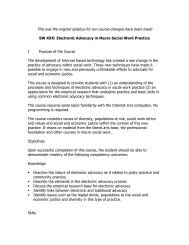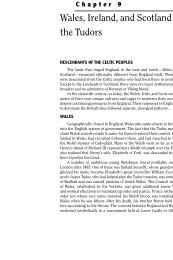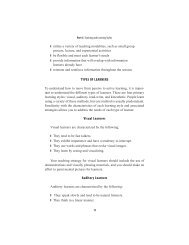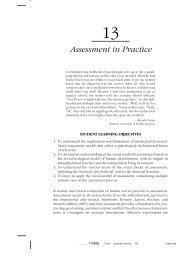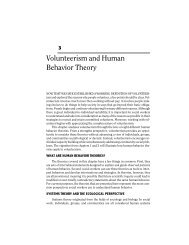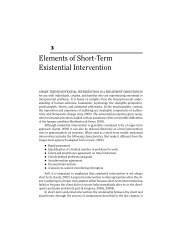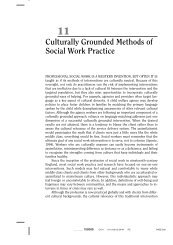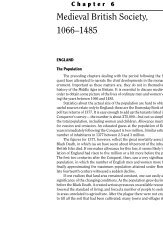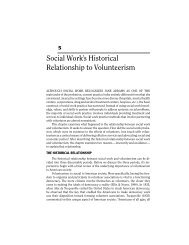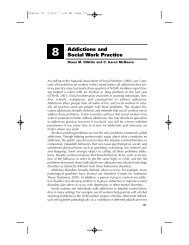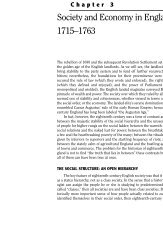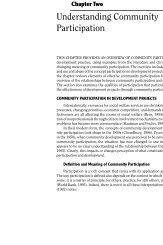Chapter 2 Self-Awareness, Critical Reflectivity, and ... - Lyceum Books
Chapter 2 Self-Awareness, Critical Reflectivity, and ... - Lyceum Books
Chapter 2 Self-Awareness, Critical Reflectivity, and ... - Lyceum Books
You also want an ePaper? Increase the reach of your titles
YUMPU automatically turns print PDFs into web optimized ePapers that Google loves.
<strong>Chapter</strong> 02 2/11/08 12:10 PM Page 25<br />
<strong>Self</strong>-<strong>Awareness</strong>, <strong>Critical</strong> <strong>Reflectivity</strong>, <strong>and</strong> Identity 25<br />
our actions may have unintended consequences for others (Kondrat, 1999). Individuals<br />
who are white may recognize that they are members of a group that<br />
has historically oppressed people from other racial/ethnic groups,<strong>and</strong> that they<br />
are perceived as such by others. Collective knowledge of race relations <strong>and</strong> personal<br />
experience with racism may make people of color reticent to accept the<br />
actions of white individuals <strong>and</strong> groups. Similarly, white individuals <strong>and</strong> groups<br />
may feel the guilt <strong>and</strong> shame of racism, which can interfere with their interactions<br />
with others. Likewise, interactions between members of different populations<br />
of color are also influenced by assumptions, biases, <strong>and</strong> prejudices.<br />
Through dialogue it is possible to build bridges across difference.<br />
One of the hidden phenomena of membership in a privileged group is the<br />
assumption of normality, according to which others are not normal. Assumptions<br />
are too often built on mythology <strong>and</strong> assumptions of one’s own normality.<br />
For instance, the assumption that growing up in a multiracial family or a family<br />
with lesbian or gay parents can harm children is not based on data. People’s interactions<br />
with others are influenced by myths like these.The consequences are<br />
destructive in social workers’ work with children <strong>and</strong> families.With guidance,<br />
the experience of difference can lead to the development not only of a strong<br />
sense of self but also empathy, compassion, <strong>and</strong> underst<strong>and</strong>ing. Unexamined belief<br />
systems <strong>and</strong> ways of knowing are not adequate preparation for engaging in<br />
relationships in a multicultural environment. Racism, heterosexism <strong>and</strong> homophobia,sexism,transphobia,<strong>and</strong><br />
ableism are pervasive in our society;even a person<br />
who sees her- or himself as unprejudiced can be guilty of these prejudices<br />
(Tatum, 1994).This realization can cause a broad range of emotions—including<br />
frustration, upset, shame, fault, <strong>and</strong> guilt (Schmitz et al., 2001). These uncomfortable<br />
feelings can create barriers to learning.Learning to recognize privileges<br />
that result from oppressive systems creates opportunities for creating change.<br />
Examination of the learning process illuminates ways in which belief systems<br />
are shaped (see figure 2.1). We enter this world lacking assumptions.<br />
Through socialization by family, friends, <strong>and</strong> other people we respect <strong>and</strong> trust,<br />
we learn stereotypes, misinformation, myths, <strong>and</strong> partial histories that glorify<br />
some, vilify others, <strong>and</strong> erase people <strong>and</strong> events by making no mention of them<br />
at all. Misinformation acquired through early learning is reinforced by institutional<br />
<strong>and</strong> cultural structures such as the media, schools, religion, <strong>and</strong> governmental<br />
<strong>and</strong> legal systems, as well as traditions <strong>and</strong> customs. At each stage of<br />
learning we consciously, or unconsciously, accept what we have been taught.<br />
These truths, as we come to know them, shape how we see ourselves <strong>and</strong> how<br />
we view others. Our self-identity can be bolstered or deflated depending on the<br />
social strata we occupy.The sense of ourselves as racist, sexist, homophobic beings<br />
brings up a variety of emotions ranging from a false sense of superiority to<br />
a false sense of inferiority. Once new learning is internalized, the potential for<br />
making informed choices exists.We can decide to pass on the misinformation<br />
<strong>and</strong> act in ways that continue to marginalize people, or we can break the cycle<br />
<strong>and</strong> become allies with marginalized groups by acting responsibly.



